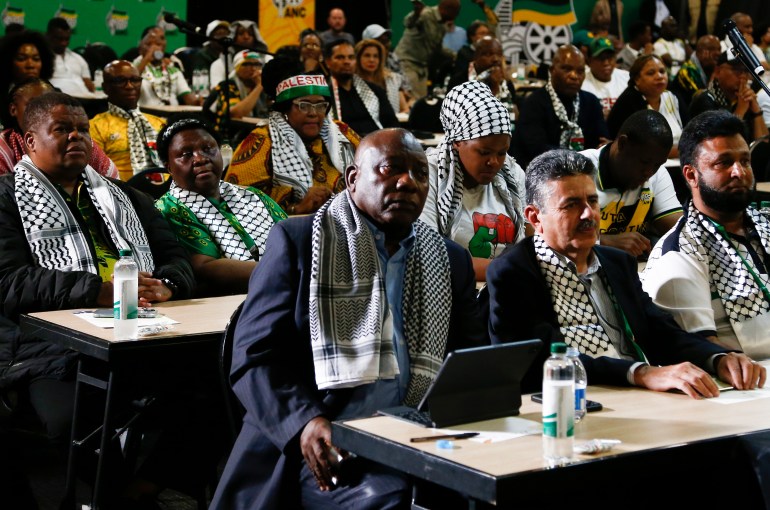On Friday, the ICJ issued its preliminary ruling in a case filed by South Africa in December, which accuses Israel of carrying out genocide in the Palestinian enclave of Gaza.
After rejecting Israel’s petition to throw out the case, the ICJ issued provisional instructions to Israel to allow aid into Gaza while taking all measures within its power to prevent acts of genocide. Moreover, Israel must preserve evidence of all its actions within Gaza and report back to the ICJ within a month, it said.
The ICJ also noted its grave concern over the fate of the Israelis taken captive by Hamas during its raid into Israel on October 7 and called for their immediate release.
While South Africa has claimed that those instructions implicitly translate as a call for an immediate ceasefire, Israel has pointed to the absence of that specific wording and has confirmed that it will continue its three-month-long campaign against Gaza.
“Really, the only body that can stop Israel’s bombardment of Gaza is Israel,” said Gerry Simpson, professor of law at the London School of Economics. “However, this does make it even more difficult for [Israeli Prime Minister] Benjamin Netanyahu to confidently claim to be defending the West and the rules-based order.”

Pressure mounting on Israel’s allies
While a final ruling may still take years, the court has found that South Africa’s charges of genocide contain merit, and cannot, therefore, be dismissed as baseless by Israel and its international backers.
Critically, the ruling raises the possibility that Tel Aviv’s allies in Washington, London and the European Union could even face the prospect of being implicated in having aided and abetted genocide at some future date.
Friday’s judgement will also likely carry implications beyond those specified in court, Simpson said. “This also speaks to how the public sees the war. No matter where you get your information, there’s always the suspicion of bias in the reporting. This preliminary judgement offers something different. This is a judicial verdict based on a good faith reading of the facts.”
Interpretations of the court’s findings are already polarising much of the political community. While South African Foreign Minister Naledi Pandor hailed it as little short of a triumph, others appeared less delighted.
Speaking after the verdict, Netanyahu claimed the court had “justly rejected the outrageous demand” to deprive Israel of what he termed its “basic right to defend itself” by ordering a halt in the fighting. Nevertheless, he continued: “The mere claim that Israel is committing genocide against Palestinians is not only false, it’s outrageous, and the willingness of the court to even discuss this is a disgrace that will not be erased for generations.”
Israeli right-wing National Security Minister Itamar Ben-Gvir was more direct, simply tweeting “Hague Shmague“.
A case for genocide is ‘plausible’
So far, more than 26,000 Palestinians, mostly women and children, have been killed during Israel’s war on Gaza while thousands more are lost under the rubble and presumed dead. In addition, some 64,500 people have been injured by Israeli attacks on the densely populated Gaza Strip, the Hamas-run Ministry of Health said this week.
While Israel’s emphasis that no specific mention was made of a ceasefire was predictable, other items were less likely to feature in Tel Israel’s public account of the judgement.
“The way that South Africa and others will interpret the order is also that Israel’s supporters have basically been put on notice,” Antonios Tzanakopoulos, professor of public international law at Oxford University, said.

“The ICJ has found that the case of genocide is at least plausible. Therefore, if third-party states continue to provide Israel with money and weapons, they now do so knowing they may be aiding and abetting genocide, which all signatories of the convention are prevented from doing,” he said.
Though it stopped short of accusing Israel of committing genocide, Italy halted all shipments of weapons to Israel after the October 7 Hamas attacks, Foreign Minister Antonio Tajani announced a week ago.
“This is what we mean by enforcement,” Tzanakopoulos said. “States aren’t physical things. You can’t send them to prison. But the kind of pressure that judgements like this bring, and the actions of states like Italy, make it more difficult to cooperate with Israel,” he said.
Under the terms of the 1948 Genocide Convention, all states have a binding obligation not only to refrain from complicity in genocide but also to prevent it, Katherine Iliopoulos, legal adviser for the MENA programme at the International Commission of Jurists, said.
“I think we can infer from the provisional measures imposed that the Court considers there to be a serious risk of genocide in Gaza. This is important because it puts all states on formal notice of this risk, which triggers their duty to take concrete steps to prevent genocide, including by ceasing arms sales and exports and other assistance that could facilitate genocidal acts,” she said.
Iliopoulos pointed to the actions of legal groups already under way, such as those in Australia, the United Kingdom and the United States, to prevent the export of weapons from their countries to Israel on the basis that they might be used to commit international crimes in Gaza. “Today’s ruling will add to such pressure on these and other countries to immediately stop arms exports to Israel,” she said.
Compliance remains an issue
A definitive ruling in South Africa’s case of genocide against Israel may take years. Moreover, as past preliminary judgements have shown, compliance remains an issue.
The 2022 ruling against Myanmar over its persecution of the Rohingya minority achieved only a partial change in tack, the United Nations noted in August. Moreover, the same year, the ICJ’s judgement against Russia following its invasion of Ukraine was simply shrugged off.
However, this is the first case against a state so closely tied to Western powers, one whose existence to a large part relies upon their provision of arms and diplomatic cover.
To what degree those states may now risk legal hazard could help determine the shape and duration of the war.
